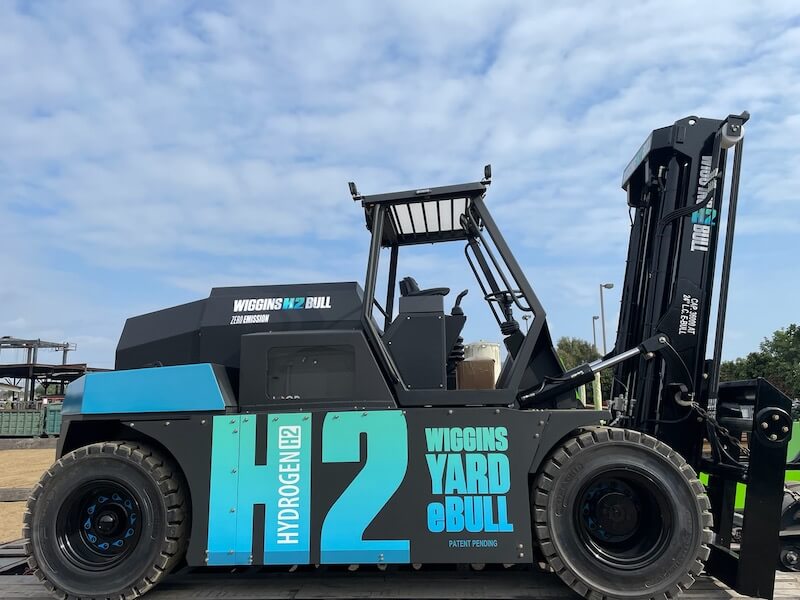Lithium Ion Batteries vs Hydrogen Fuel Cells – What’s Best for Your Forklift Fleet?
As the world shifts towards sustainable energy solutions, the debate between lithium ion batteries and hydrogen fuel cells intensifies.
However, it’s rare for this debate to focus specifically on forklifts, which is what we want to do today.
Below, we’ll explore the merits of both options when it comes to forklift technology specifically, and why the answer to the hydrogen vs. lithium debate might not be as straightforward as it seems.
Lifespan and Sustainability
When it comes to material handling equipment like forklifts, the lifespan of power sources takes center stage. Here, hydrogen fuel cells tend to shine. Unlike lithium batteries, which undergo degradation over time, hydrogen fuel cells maintain their efficiency as long as a hydrogen supply is available.
This unceasing reaction with oxygen to generate electricity makes hydrogen a steadfast choice, especially in the high-intensity demands of warehouses and distribution centers.
The extended lifespan of hydrogen fuel cells also reduces the frequency of replacements, which itself contributes to sustainable operations.
Environmental Considerations
While lithium ion batteries are hailed as eco-friendly, the process of mining lithium has significant environmental implications. Similarly, hydrogen fuel cells require resources like platinum, aluminum, and iridium, which contribute to their carbon footprint.
Hydrogen’s sourcing also raises concerns, as “green” hydrogen from renewable sources is ideal but not always practical. On the other hand, batteries are dependent on minerals often sourced through mining, raising ethical and environmental concerns.
So while both energy sources are a step in the right direction for zero emissions, there are still important environmental implications to weigh.
Energy Density and Range
When it comes to energy storage density, hydrogen fuel cells again take the lead, boasting a superior energy-to-weight ratio compared to lithium ion batteries. This advantage directly translates into extended range capabilities, a vital aspect in optimizing the efficiency of forklift operations within ports, warehouses and industrial settings.
Also, fuel cells’ compact and lightweight nature further enhances their compatibility with heavy-duty machinery, ensuring seamless integration without compromising on performance.
Lithium’s Many Benefits
So far, it would appear hydrogen fuel cells present an impressive array of benefits. But it’s important to acknowledge that lithium ion batteries also hold their place in the realm of clean energy solutions.
For applications where compact size and ease of installation are paramount, lithium batteries are especially beneficial. Their ability to fit into smaller spaces and adapt to diverse settings makes them ideal for certain environments.
Plus, the technology surrounding lithium ion batteries is advancing rapidly. Developments in energy density and extended lifespans continue to enhance their appeal.
Synergy and Future Prospects
Both hydrogen and lithium-powered forklifts undeniably have their advantages and drawbacks. However, in today’s dynamic landscape, the choice between these two technologies often boils down to the specific needs and operational context of your business.
For forklift applications, your decision may hinge on the precise operational requirements you face. Lithium-ion batteries, for instance, provide instantaneous power, making them well-suited for shorter bursts of activity. On the other hand, hydrogen fuel cells shine in scenarios demanding prolonged operation and quick refueling capabilities.
Why a Hybrid Approach Delivers the Best of Both Worlds
Rather than framing this as a competition between the two technologies, it’s crucial to adopt a holistic perspective that recognizes their individual strengths. At XL Lifts, we’re taking this comprehensive approach a step further by offering forklifts that integrate both lithium-ion batteries and hydrogen fuel cells into our cutting-edge forklift units.
In the end, our stance is that the future lies in combining the benefits of both technologies. That’s why in addition to our pure lithium-ion forklifts, we also offer hybrids, harnessing the power of both batteries and hydrogen to maximize efficiency. This innovative hybrid model optimizes forklift performance, ensuring it aligns perfectly with your operational needs. While running purely on hydrogen can be cost-prohibitive today, our hybrid solution offers a pragmatic and forward-thinking approach.
While hydrogen costs remain a concern, our hybrid forklifts provide a practical solution that leverages the strengths of both technologies.As technology continues to advance, we anticipate that the cost of hydrogen will eventually become more competitive. In the meantime, our hybrid forklifts empower your business to operate efficiently, reduce emissions, and remain agile in a rapidly changing landscape.


No Comments